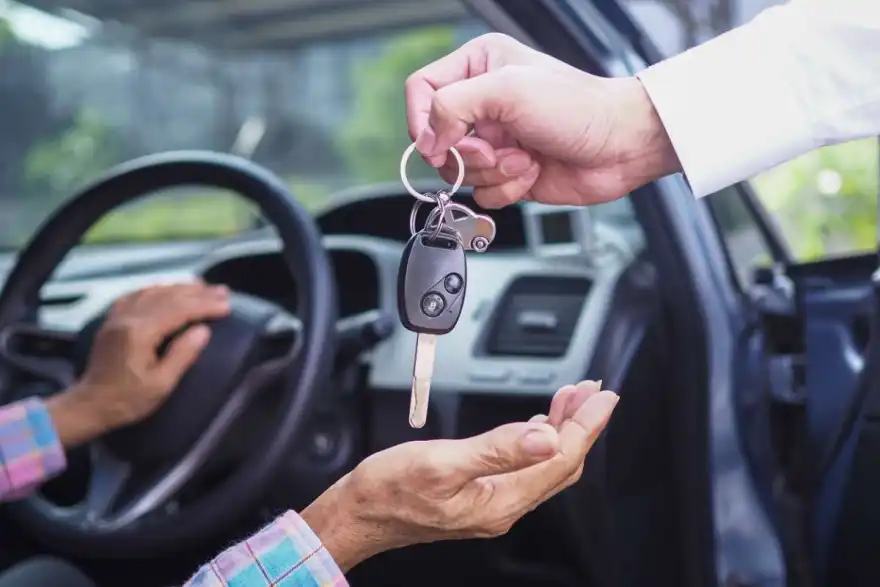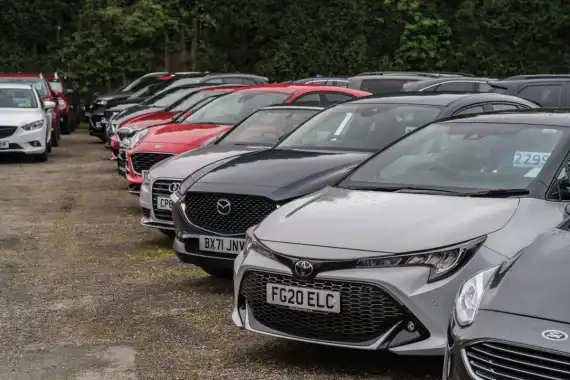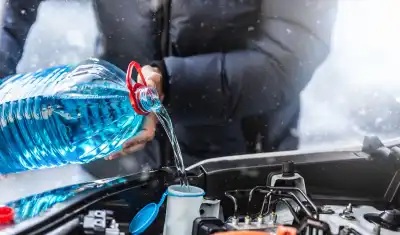
Buying a used car can be significantly cheaper than purchasing a new one, but it comes with certain risks. It's crucial to be meticulous to ensure you make a wise investment and avoid potential pitfalls. Our comprehensive guide will provide you with all the information needed to buy with confidence and secure a good deal. This advice covers every aspect of the car-buying process, from selecting where to buy to inspecting the car, negotiating, and understanding your rights as a buyer.
Where to Buy a Used Car
You've decided on a used car, but where should you buy it?
We examine the pros and cons of different types of sellers and what to watch out for to find the best fit for your needs.
1. Buying from a Dealer, Independent Garage, or Driveway Trader
If you're apprehensive about buying a secondhand car, starting with a dealer or trader is advisable, as private sales often require more automotive knowledge.
Understanding Traders:
A trader can be anyone from a single individual selling cars from their driveway to a franchised dealer offering new and nearly new cars. The primary difference among these traders lies in the level of preparation and after-sales support they provide, as well as the associated costs. Larger businesses have more resources but also higher overheads, which can increase your costs.
Considerations:
- Main Dealers or Garages: These typically conduct rigorous inspections and offer warranties (usually six or 12 months). While this increases the purchase price, it provides peace of mind knowing the car has been thoroughly checked and is covered by a warranty.
- Driveway Traders: These sellers may offer lower upfront costs but could be a false economy if the car requires significant repairs. Such traders often do minimal preparation, possibly just cleaning the car after acquiring it from an auction.
All traders must comply with the Consumer Rights Act, entitling you to repair, replacement, or refund if the vehicle is not 'fit for purpose' or 'of satisfactory quality.' However, enforcing these rights can be challenging with unscrupulous sellers. Note that your right to reject the vehicle and claim a full refund is typically limited to the first 30 days.
It's also important to remember that under the Road Traffic Act 1988, it's illegal to sell an unroadworthy vehicle. More details can be found in our buyer's rights section.
Decision-Making:
Consider your needs and the car's intended purpose. If you're looking for a long-term family car, investing in the security provided by a garage may be worth the higher cost. For a temporary or low-cost vehicle, you might opt for the lowest price despite fewer guarantees.
Independent garages often cater to the mid-range market—cars too old for main dealers but not yet "bargain bangers." They usually care about their reputation, so online reviews can be insightful. Be wary, though, as the quality of preparation and the value of warranties can vary. Always read the terms and conditions carefully.
Our guide aims to help you navigate the used car market confidently, ensuring you make an informed and secure purchase.
Buying a Used Car Privately
If you're on a budget, buying a secondhand car privately can be significantly cheaper than purchasing from a dealer. However, it's essential to weigh the benefits and drawbacks to determine if this is the best route for you.
Pros
- Lower Prices and Room for Negotiation: Private sellers typically price their cars lower than dealers, as they aren't looking to make a profit. This often leaves more room for negotiation.
- Insight into Car History: Buying privately allows you to meet the previous owner, giving you a sense of how well the car has been maintained. If the car is clean with minimal bodywork issues, it's likely been well cared for. In contrast, dealership cars are professionally cleaned, making it harder to gauge their maintenance history.
- Understanding Seller's Motives: Interacting directly with the seller allows you to understand why they are selling the car. This can help you assess if there are any underlying issues with the vehicle.
Cons
- Potential Overvaluation: Some private sellers overprice their cars, asking amounts similar to dealership prices. These sellers might eventually lower their prices, but it could require patience.
- Lack of Rigorous Checks: Unlike dealership cars, privately sold vehicles haven't undergone comprehensive health checks. You'll need to be thorough in your inspections and test drives. Our guide covers all the necessary checks in the "Viewing the Car" section.
- Fewer Buyer Protections: Purchasing privately means you have fewer legal protections compared to buying from a dealer. If the car breaks down soon after purchase, you might have little recourse. You can learn more about your buyer's rights in our dedicated section.
Buying a used car privately can be cost-effective, but it requires careful consideration and thorough inspection to ensure you're making a sound investment.

Buying a car from auction
Purchasing a used car from an auction can be a mixed bag, and many buyers proceed with caution.
Auction cars are typically sold quickly, often without warranties or much buyer protection.
However, with careful selection, significant savings are possible.
Pros
- Bargains: Auctions can yield great deals, especially if competition is low.
- Speed: The process is quick and straightforward.
- Market Insight: Auctions provide a clear view of what people are willing to pay for specific vehicles.
- Flexibility: Opportunities to buy are available before and after the auction, allowing more time to decide.
Cons
- Increased Competition: Bargains are becoming rarer as dealers turn to eBay auctions and more amateur traders enter the market.
- Pressure: Decision-making time is limited, which can lead to rushed and poor choices.
- Inexperienced Buyers: Private buyers are getting involved more, increasing competition.
- Limited Inspection: Thorough inspections and test drives aren't usually possible, which can be risky.
Buying a used car online
The trend of online shopping extends to major purchases like cars. While car manufacturers are beginning to sell new cars online, buying used cars on the internet has been popular for years, especially through platforms like eBay.
Ways to Buy:
Auction: Place bids on cars up for auction.
Buy It Now: Purchase immediately at a set price.
Tips for Online Purchases:
Inspect in Person: Ideally, inspect the car and meet the seller before finalizing the purchase. While this adds a layer of safety, being willing to take some risks might lead to great deals.
Deposits: Expect to pay a deposit via PayPal before collecting the car.
Walk Away if Necessary: If the car isn't as described when you see it, you can walk away from the deal. However, once you agree to buy, you're committed unless there's a significant discrepancy.
Long-Distance Purchases:
If the car is far away and you can't collect it in person, transport companies can deliver it for a reasonable fee.
Used car test drive checklist
When buying a car, taking a test drive is essential.
Before you do, ensure you, the dealership, or the private seller have the proper insurance. Temporary car insurance, which can be arranged online in about 15 minutes, is designed for this purpose and can be valid for as little as an hour.
Here are other crucial considerations:
- Does it start properly? A car that struggles to start might need a new battery or alternator.
- Check the temperature gauge at startup If the seller has pre-warmed the car, ask why. If possible, start the engine cold and also test restarting it after it’s been running.
- Monitor the temperature gauge The gauge should reach halfway fairly quickly and remain stable. A faulty thermostat or overheating might indicate serious issues.
- Check the clutch Is the clutch easy to engage, or does it engage high on the pedal travel? Accelerate uphill in a high gear to test for slipping. Also, check for clean pullaways or clutch judder. Clutch replacement can be costly, so test multiple cars to understand what's normal.
- Check the transmission Gears should shift smoothly without being notchy, sloppy, or making crunching noises. The gear stick should self-center when out of gear. For automatics, ensure smooth gear changes that align with road speed and engine load.
- Check the steering Steering should operate smoothly without odd noises. Test if the power steering works properly and whether the car tracks straight on a level road when you briefly let go of the wheel.
- Test the suspension Drive over bumpy roads and listen for thunks or clunks and feel for unusual jolts. Different cars have different suspension firmness, so consider what's appropriate for the model.
- Listen to the engine Turn off the radio during the test drive to listen to the engine. It should run smoothly, not rough or noisy, which might indicate neglect.
- Assess performance Accelerate through the gears to ensure the car keeps up with traffic as expected. Overly sluggish performance could indicate problems.
- Test the brakes When safe, brake hard to check if the car stops cleanly and in a straight line without unusual noises. Also, ensure the handbrake, including electronic ones, works properly.
- Consider personal comfort Beyond identifying faults, ensure the car suits your needs. Is the driving position comfortable? Would it be suitable for your typical journeys? A car is a significant investment, so make sure it’s the right choice for you.




